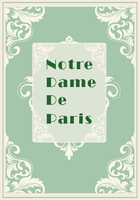
第10章 BOOK Ⅰ(7)
'Oh,nothing!'said Liènarde,all confused;'it is my neighbour,Gisquette la Gencienne,who wants to speak to you.'
'Not at all,'said Gisquette,blushing,'it was Liènarde who called you'Maitre,'and I told her she ought to say'Messire.''
The two girls cast down their eyes.The stranger,nothing loath to start a conversation with them,looked at them smilingly.
'So you have nothing to say to me,ladies?'
'Oh,nothing at all,'Gisquette declared.
'No,nothing,'added Liènarde.
The tall young man made as if to retire,but the two inquiring damsels were not inclined to let him go so soon.
'Messire,'began Gisquette with the impetuous haste of a woman taking a resolve,'it appears you are acquainted with the soldier who is going to play the part of Madame the Virgin in the Mystery.'
'You mean the part of Jupiter,'returned the unknown.
'Yes,of course!'said Liènarde.'Isn't she stupid?So you know Jupiter?'
'Michel Giborne?Yes,madame.'
'He has a splendid beard,'said Liènarde.
'Will it be very fine what they are going to say?'asked Gisquette shyly.
'Extremely fine,mademoiselle,'responded the unknown without the slightest hesitation.
'What is it to be?'asked Liènarde.
'The Good Judgment of Madame the Virgin,'a Morality,an it please you,mademoiselle.'
'Ah!that's different,'rejoined Liènarde.
A short silence ensued.It was broken by the young man.
'It is an entirely new Morality,'said he,'and has never been used before.'
'Then it is not the same as they gave two years ago on the day of the entry of Monsieur the Legate,in which there were three beautiful girls to represent certain personages—''Sirens,'said Liènarde.
'And quite naked,'added the young man.
Liènarde modestly cast down her eyes.Gisquette glanced at her and then followed her example.
'It was a very pleasant sight,'continued the young man,unabashed.'But the Morality to-day was composed expressly for Madame the Lady of Flanders.'
'Will they sing any bergerettes?'asked Gisquette.
'Fie!'exclaimed the unknown;'love-songs in a Morality?The different sorts of plays must not be confounded.Now,if it were sotie,2 well and good—''What a pity!'returned Gisquette.'That day at the Ponceau fountain there were wild men and women who fought with one another and formed themselves into different groups,singing little airs and love-songs.'
'What is suitable for a legate,'remarked the unknown dryly,'would not be seemly for a princess.'
'And close by,'Liènarde went on,'a number of deep-toned instruments played some wonderful melodies.'
'And for the refreshment of the passer-by,'added Gisquette,'the fountains spouted wine and milk and hypocras from three mouths,and every one drank that would.'
'And a little below the Ponceau fountain at the Trinitè,'continued Liènarde,'there was a Passion Play acted without words.'
'Yes,so there was!'cried Gisquette.'Our Lord on the cross and the two thieves to right and left of him.'
Here the two friends,warming to the recollection of the legate's entry,both began talking at once.'And farther on,at the Porte-aux-Peintres,were other persons very richly dressed.'
'And at the Fountain of the Holy Innocents,that huntsman pursuing a him with great barking of dogs and blowing of horns.'
'And near the slaughter-house of Paris,that wooden erection representing the fortress of Dieppe.'
'And you remember,Gisquette,just as the legate passed they sounded the assault,and all the English had their throats cut.'
'And near the Chatelet Gate were some very fine figures.'
'And on the Pont-au-Change,too,which was all hung with draperies.'
'And when the legate passed over it they let fly more than two hundred dozen birds of all kinds.That was beautiful,Liènarde!'
'It will be far finer to-day,'broke in their interlocutor at last,who had listened to them with evident impatience.
'You can promise us that this Mystery will be a fine one?'said Gisquette.
'Most assuredly I can,'he replied;then added with a certain solemnity,'Mesdemoiselles,I am myself the author of it.'
'Truly?'exclaimed the girls in amazement.
'Yes,truly,'asserted the poet with conscious pride.'That is to say,there are two of us—Jehan Marchand,who sawed the planks and put up the wooden structure of the theatre,and I,who wrote the piece.My name is Pierre Gringoire.'
Not with greater pride could the author of the Cid have said,'I am Pierre Corneille.'
Our readers cannot have failed to note that some time had elapsed between the moment at which Jupiter withdrew behind the curtain,and that at which the author thus abruptly revealed himself to the unsophisticated admiration of Gisquette and Liènarde.Strange to say,all this crowd,so tumultuous but a few minutes ago,were now waiting patiently with implicit faith in the player's word.A proof of the everlasting truth still demonstrated in our theatres,that the best means of making the public wait patiently is to assure them that the performance is about to begin.
However,the scholar Joannes was not so easily lulled.'Holá!'he shouted suddenly into the midst of the peaceful expectation which had succeeded the uproar,'Jupiter!Madame the Virgin!Ye devil's mountebanks!would you mock us?The piece!the piece.Do you begin this moment,or we will—'This was enough.Immediately a sound of music from high-and low-pitched instruments was heard underneath the structure,the curtain was raised,four party-coloured and painted figures issued from it,and clambering up the steep ladder on to the upper platform,ranged themselves in a row fronting the audience,whom they greeted with a profound obeisance.The symphony then ceased.The Mystery began.